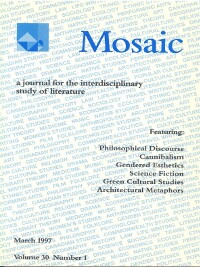Issue 30.1
Overview

General Issue
Published: March 1997
View the issue introduction or see the issue summary and contents below.
6 essays, totalling 128 pages
$15.00 CAD
This general issue marks thirty years of publication for Mosaic and an innovation in style. It introduces a “Reader’s Response” forum to foster dialogue among Mosaic’s community of writers and readers. This issue includes essays on paradox and Seneca, cannibalism in James de Mille, the male gaze in Henry James and George Eliot, utopian scientism in Yevgeny Zamyatin (published in French), an argument for a new area of scholarship called green cultural studies (eco-criticism); and architecture and postmodernism in Don DeLillo and Antonin Artaud.
Challenging Prescriptions for Discourse: Seneca’s Use of Paradox and OxymoronJon Stewart Designed to question current Anglo-American theories about appropriate philosophical discourse, this essay focuses on Seneca’s Epistulae Morales and argues that, because his task was to present doctrines that were counterintuitive to the Roman values of his time, Seneca could not have effectively employed the kind of transparent writing espoused by contemporary analytic philosophy and was actually much better served by such literary devices as paradox and oxymoron. | |
Cannibals and Critics: An Exploration of James de Mille’s Strange ManuscriptMaggie Kilgour This essay examines the lurid interest in cannibalism that appears in both culture and criticism today. Looking at the role that the figure of the cannibal has traditionally played in societies, the discussion focuses especially on a 19th-century Canadian text, which places cannibalism at its center and criticism at its circumference. | |
The Gendered Politics of the Gaze: Henry James and George EliotPatricia E. Johnson By examining scenes in which Isabel Archer and Dorothea Brooke are placed in art galleries and gazed at by male characters, this essay argues that James’s omniscient narrator adopts the male gaze while Eliot’s questions it and foregrounds what is at stake, esthetically and politically, in such representations of women. | |
Science et Utopie: Nous autres de ZamiatineLaurence Dahan-Gaida La présente étude questionne les enjeux épistémoloques du roman de Zamiatine, Nous autres. Elle s’attache à mettre en évidence le rôle joué par les concepts d’entropie et d’énergie, que Zamiatine emprunte à la thermodynamique. Mis au service d’une vision dynamique du devenir, ces concepts permettent de redéfinir l’utopie comme perpétuelle impulsion au changement et de rompre ainsi avec la vision d’un mode sans différence ni différend, où l’utopie se condamne nécessairement. | |
Green Cultural Studies: An Introductory Critique of an Emerging DisciplineJhan Hochman Nature runs into obstacles, both when it attempts to be included in cultural studies’ concerns with race, class, gender, age, and sexuality, and when it is included. This essay argues for nature’s necessary inclusion—i.e., for a “green cultural studies”—but critiques particular ways in which nature is repeatedly theorized. | |
Linguistic Disenchantment and Architectural Solace in DeLillo and ArtaudZ. Bart Thornton Countering the notion that Don DeLillo is a paradigmatic postmodernist, this essay argues that DeLillo’s cynicism about communication is undercut by his architectural esthetics and that his “postmodernism” is rooted in a modernism that recalls that of Antonin Artaud. Architecture, for both, plays a pivotal role in the construction of meaning. |